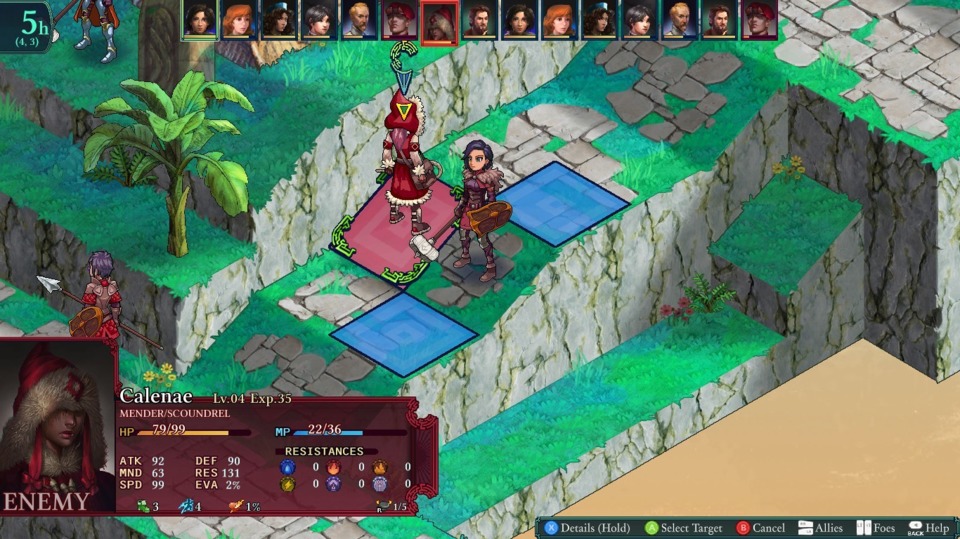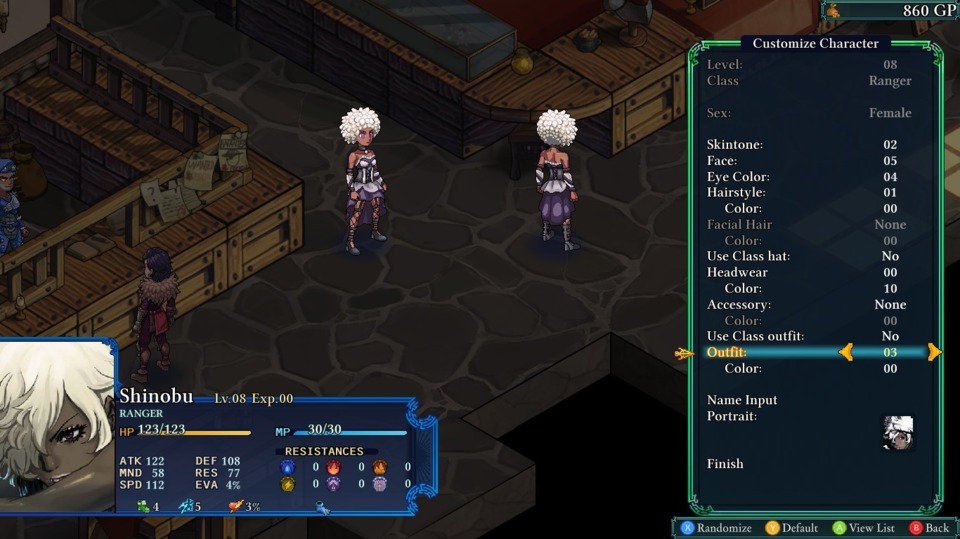Indie Game of the Week 173: Fell Seal: Arbiter's Mark
By Mento 4 Comments

All right, I've seen this phenomenon often enough that it's time to come up with a terrible name for it. "Truncapable." There you go. An adjective that describes any Indie game inspired by big-budget RPGs that must truncate many aspects out of necessity due to less resources and a smaller development team, while still capably delivering on the layers of complexity and enjoyment those originals offered via some resourceful game design. In other words, an Indie-fied spin on a classic that makes serious cuts, and yet feels fresh and playable due to some smart choices.
We've seen this previously in this feature with Aarklash Legacy (IGotW #92), Victor Vran (IGotW #137), and most recently Death's Gambit (IGotW #170): in each case, there's an accompanying major budget (if somewhat old) game or series by which they're influenced. Aarklash is riffing on the Infinity Engine series, in particular the way they balance tactical real-time action with turn-based planning, and focuses less on elaborate D&D character builds and systems that would be a nightmare for a smaller studio to implement or balance and more on last-second dodging of enemy projectiles and maneuvering to make the best use of circle and cone AoEs; Victor Vran is a loot RPG that offered a slimmed down version of Diablo with fewer possible builds, instead focusing on strong weapon diversity, more defensive options by way of evasive dodging and jumping, and challenging bonus objectives to pursue; and Death's Gambit is a stripped down Dark Souls that retains the gothic vibe and corpse runs while reducing the size of its world, switching to 2D to incorporate some explormer elements, and making the classes feel more specialized including one that operates on Bloodborne's "press the retaliation to recover lost health" mechanics.

Fell Seal: Arbiter's Mark is the newest Indie game I've played to use this sort of approach, as it's evident after the initial battle that the developers have more than a fondness for venerable PS1 SRPG cornerstone Final Fantasy Tactics. Characters progress by earning "ability points" for their current class, spent between battles, and mastering these classes eventually unlocks new classes for them to explore. Units add to their versatility by combining their primary class with a sub-class - incorporating the ability tree of a previous, currently inactive class to bolster the current - as well as passive skills and counter abilities, some of which are more effective with the right class/build. The Job system is frequently lauded as one of the Final Fantasy franchise's greatest innovations, and it's heartening to see an Indie try their hand at it, albeit in a somewhat truncated (or truncapable?) fashion.
Fell Seal's story follows Kyrie the Arbiter, a position analogous to a sheriff or federal agent, who goes around enacting the will of the country's ruling council of Immortals: seven powerful, near-ageless heroes who now occupy an administrative role in keeping the peace. A chance encounter with a murderous noble sets Kyrie on a course to uncover corruption in the Immortal council and the Arbiters they command, ever accompanied by her roguish stepbrother Reiner and wide-eyed protégé Anadine. She's also followed by any number of player-made mercenaries, and these footsoldiers are given more emphasis in Fell Seal than they ever were in Final Fantasy Tactics, where they were regularly eclipsed and replaced by the many more talented story characters Ramza accrued as the game went on.
Playing the game, it feels like a slightly less mechanically-rich Final Fantasy Tactics. (Or, to put it another way, like a Final Fantasy Tactics Advance.) Flank and rear attacks do more damage, but a superior height difference doesn't. You can push enemies off cliffs for additional fall damage or into water to drown them, but you can't, say, hit a partially submerged unit with electricity magic for more damage than usual due to the added conduction. It's a little bit of a shame but a totally acceptable compromise given just how complex FFT was, and remains even to this day. Instead, Fell Seal finds its innovations via some clever convenience and accessibility routes. A few examples: instead of a stockpile of items that you're ever cautious about burning through, items in Fell Seal operate like Estus Flasks in that they all refresh after a battle but their usage is still strictly limited. This gives you ample reason to toss out anything you might have if it'll help without worrying that you'll need it for a future boss fight, but conversely prevents you from spamming potions and instead encourages you to rely on healers (or someone with a healer sub-class, at least). Items also cannot be bought, only upgraded with the game's crafting system - this means you can eventually earn stronger versions of consumables and/or use them with more frequency, but only if you're diligent about obtaining spoils. Another player-friendly concession is in how Ability Points are earned: characters not only gain AP if they're not part of the battle, albeit in smaller amounts, but earn AP in their allies' classes in addition to their own via "vicarious learning". This not only allows you to progress towards unlocking classes without temporarily forcing, say, a magic-focused class to switch to a combat role (which they'll be weaker at due to their stat distribution), but also encourages you to develop a team of diverse talents so all those vicarious learning AP bonuses get spread around less-used classes like rangers and druids. There's also an injury system that replaces permadeath (unless playing on a higher difficulty setting) in that a fallen unit will receive a stat penalty in future battles unless they sit one out to recover. This again has the double application of a suitably harsh punishment that won't undo hours of character development put into some expendable merc, as well as a reason to keep a larger team of back-ups around to step in for those who might need a break.
Fell Seal is doing its best Final Fantasy Tactics impression for both the combat and story, and bless it for trying even if it occasionally feels like an amateur production re-enactment of the War of the Lions, but for all the ways it simplifies things for the sake of a more streamlined and Indie-approachable product, it smartly compensates for those shortcomings with its intelligent ideas. Its character models, though they might resemble the avatars of some long-forgotten social media MMO, allow for a great deal of visual customization to help personalize your team (though you cannot change the appearances of the main characters, which is probably for the best). The pixel graphics are so detailed that I might recommend having a hefty resolution before playing, as anything less than 1050 pixels on the vertical axis makes the action feel way too zoomed in unless you choose to scale down the graphics and lose some of the image quality. I can't say I've ever faced that particular problem in a pixel-based game before, but it's probably a sign of the times more than anything else.

I'm only five hours in, but I'm going to stick with Fell Seal for a while longer. I'm invested in the story, such as it is, and in seeing what the more elaborate classes are like once I've addressed their demanding prerequisites. While its not quite as well-written, exciting, or as complex as Final Fantasy Tactics it's the best approximation I've seen of the Squaresoft nonpareil outside of a Tactics Ogre or Nippon Ichi Software title, which is all the more impressive given the limited means these developers must have had. I don't think "truncapable" will catch on as a term, but the Indie RPGs it describes definitely have a future if they're all as carefully considered as this.
Rating: 4 out of 5 (so far).
| < Back to 172: Mutazione | The First 100 | > Forward to 174: Sundered: Eldritch Edition |
